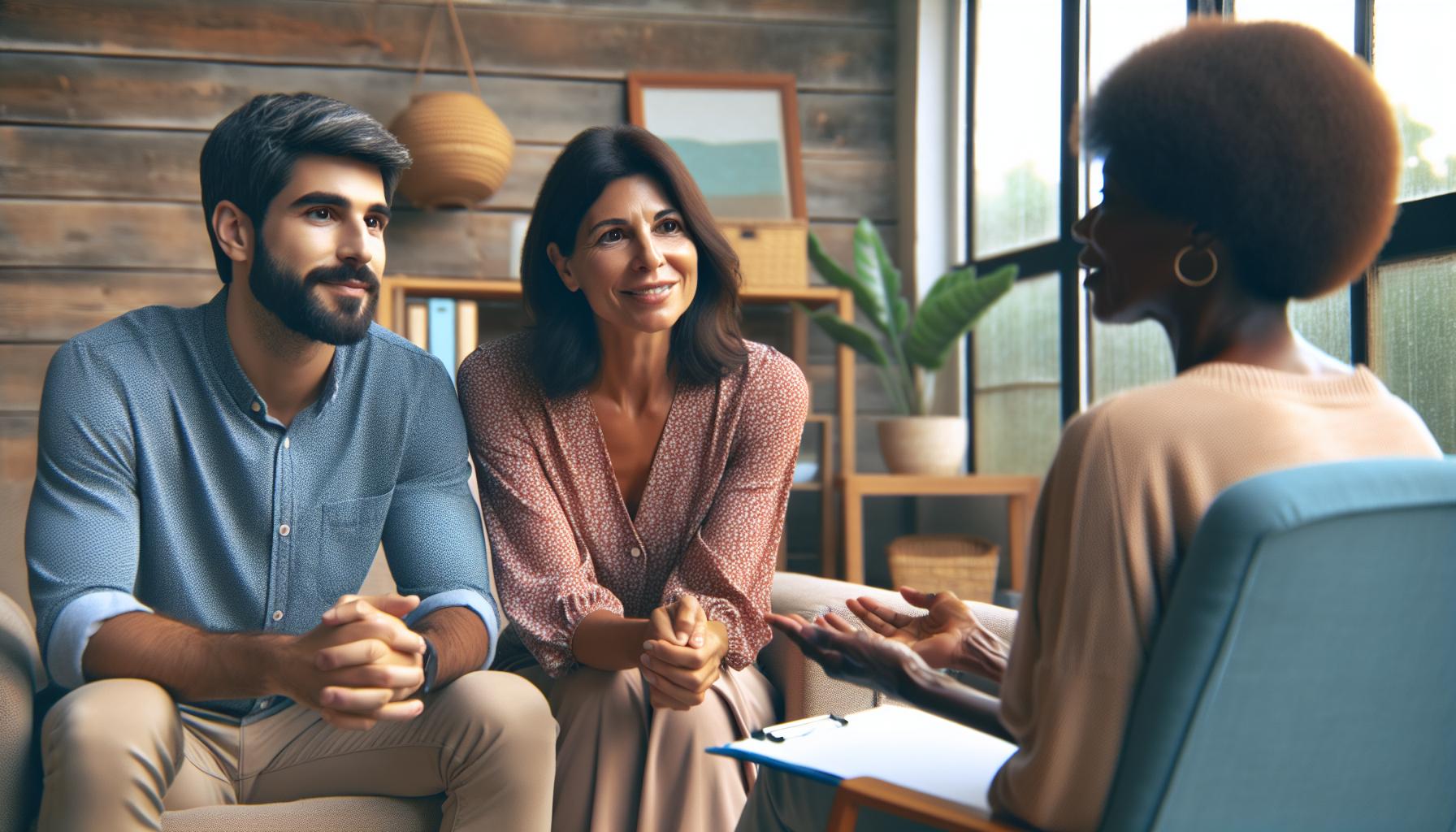Physical Address
304 North Cardinal St.
Dorchester Center, MA 02124
Physical Address
304 North Cardinal St.
Dorchester Center, MA 02124

Navigating the ups and downs of relationships can feel like a wild rollercoaster ride—thrilling, yes, but also a bit nauseating at times. For couples in Atlanta, GA, relationship counseling offers a lifeline to help them steer clear of those heart-pounding drops and unexpected turns. Whether it’s communication hiccups or the classic “we need to talk” moments, professional guidance can turn potential disasters into opportunities for growth.
Relationship counseling provides a supportive environment where couples can explore their issues. Professionals in Atlanta, GA, focus on improving communication, which often leads to deeper understanding between partners. Many couples seek counseling to address recurring conflicts that hinder their connection.
Therapists employ various techniques tailored to the couple’s unique dynamics. These approaches include active listening, emotional validation, and guided discussions. Effective counseling helps partners articulate their feelings and desires, paving the way for conflict resolution.
Trust building is another critical aspect of the counseling process. As partners work together in therapy, they learn to create safe spaces for honest conversations. Rebuilding trust can lead to enhanced intimacy and emotional closeness.
Numerous issues may prompt couples to seek help, such as infidelity, financial stress, or differing life goals. Many professionals in Atlanta use evidence-based methods to address these concerns. Partner workshops and individual sessions may also supplement traditional counseling.
Success often depends on the couple’s commitment to the process. Regular attendance at sessions and openness to change can significantly improve outcomes. As couples develop better communication skills, they strengthen their relationship and enhance their overall satisfaction.
The journey through relationship counseling can be transformative. Many couples emerge from sessions with renewed perspectives and strategies to navigate future challenges. Based on professional insights, growth through counseling fosters resilience in relationships, enabling couples to thrive.

Relationship counseling provides essential support for couples facing challenges. Professional guidance helps partners navigate complex emotions and strengthens relational bonds.
Improved communication serves as a foundation for healthy relationships. Therapists encourage couples to express thoughts and feelings openly. Active listening techniques allow partners to understand each other’s perspectives. Non-verbal cues also contribute to enhancing dialogue. Building emotional vocabulary empowers partners to articulate needs effectively. Overall, this process fosters intimacy and trust.
Conflict resolution plays a crucial role in relationship counseling. Counselors guide couples in identifying root causes of disputes. Structured approaches help partners engage in constructive conversations. They learn to recognize patterns of behavior contributing to tensions. Additionally, reframing conflicts as opportunities for growth can shift perspectives. Ultimately, mastering conflict resolution techniques promotes long-term relational harmony.

Several forms of relationship counseling exist to address various needs. Each type plays a unique role in assisting individuals and couples in navigating their challenges.
Individual counseling focuses on personal growth and self-awareness. Clients often explore their emotions, behaviors, and past experiences impacting their relationships. This approach allows individuals to gain clarity and enhance emotional intelligence, leading to healthier interactions with their partners. Personal insights gained during these sessions often translate into improved relationship dynamics. Therapists may utilize cognitive behavioral techniques to help clients identify negative thought patterns. Ultimately, clients leave with strategies to cultivate healthier relationships and resolve internal conflicts.
Couples counseling involves both partners working collaboratively towards shared goals. This type emphasizes open communication and problem-solving strategies tailored to the couple’s unique dynamics. Therapists facilitate conversations that foster understanding and intimacy, encouraging each partner to express their feelings. Conflict resolution is a fundamental aspect, allowing couples to identify underlying issues and address them constructively. Through guided discussions, partners often discover new ways to reconnect and strengthen their bond. Success in couples counseling hinges on mutual commitment to the process and a willingness to embrace change.
Locating a qualified relationship counselor in Atlanta, GA, involves identifying professionals who align with specific needs. It’s essential to prioritize credentials and experience to ensure effective guidance.
Seek licensed professional counselors with expertise in relationship dynamics. Look for certifications in couples therapy or family therapy, as these indicate specialized training. Verify credentials through professional organizations such as the American Association for Marriage and Family Therapy or the American Psychological Association. Experience matters, with those having several years in practice often better equipped to handle complex issues. Additionally, consider those who participate in ongoing education, as this signals a commitment to staying current with therapeutic techniques.
Inquire about the counselor’s approach to therapy when seeking a good fit. Ask how they address communication issues, as this reveals their methods in fostering dialogue. Exploration of their experience with specific challenges, such as infidelity or financial stress, is vital. It’s also useful to understand the structure of sessions, focusing on how the counselor encourages participation from both partners. Clarifying what success looks like in therapy can provide insight into their philosophy. Finally, discussing confidentiality practices ensures trust remains a cornerstone of the therapeutic relationship.
During counseling sessions, couples will engage in structured conversations guided by a trained therapist. Each meeting often focuses on identifying underlying issues and discussing feelings openly. Active listening plays a crucial role as therapists encourage partners to express thoughts without judgment.
Sessions may include exercises aimed at enhancing communication skills. Couples might participate in role-playing activities that simulate real-life situations. Each participant will learn to articulate feelings better, fostering an environment of understanding.
Expect a safe space for discussing sensitive topics. Trust is built through creating an atmosphere where honesty is valued. Partners often report feeling more connected as they navigate complex emotions together.
Therapists frequently provide tools for conflict resolution. Couples will explore the root causes of their disagreements. This exploration transforms conflicts into growth opportunities.
Homework assignments may also be given to reinforce lessons learned during sessions. Couples might be tasked with practicing specific communication techniques at home. Regular attendance and application of these strategies significantly improve outcomes.
As sessions progress, couples often gain insight into their patterns of behavior. Understanding these dynamics helps identify areas needing change. Each session builds on the previous one, leading to gradual improvement in the relationship.
Before concluding each session, therapists typically summarize key points discussed. This recap helps reinforce learning and encourages partners to apply insights outside of therapy. Openness and commitment to the counseling process create a path toward healthier relationships.
Relationship counseling in Atlanta, GA offers couples a valuable opportunity to strengthen their bonds and enhance communication. By engaging with skilled therapists, partners can explore their emotions and navigate complex issues in a supportive environment. The journey through counseling not only addresses immediate challenges but also equips couples with lasting tools for future success.
With commitment and openness, couples can transform their relationships, fostering resilience and deeper understanding. As they work through conflicts and develop healthier communication patterns, they pave the way for a more fulfilling connection. Seeking professional help can be a pivotal step towards a thriving partnership, ensuring that love and intimacy continue to flourish.